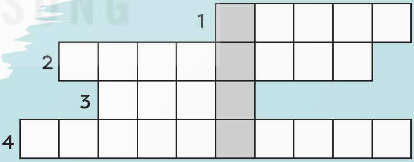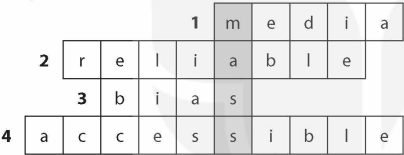 Tiếng Anh 12 Global Success, giải Tiếng Anh 12 Kết nối tri thức hay nhất
Tiếng Anh 12 Global Success, giải Tiếng Anh 12 Kết nối tri thức hay nhất
 Unit 7: The world of mass media
Unit 7: The world of mass media Tiếng Anh 12 Unit 7 Looking back
Pronunciation Work in pairs and mark (ᴗ) the places where the linking /r/ can appear. Listen and check. Then practise saying the sentences. Vocabulary Solve the crossword with the words you've learnt in this unit. What is the hidden word? Grammar Circle the mistake in each sentence. Then correct it.
Pronunciation
Work in pairs and mark (ᴗ) the places where the linking /r/ can appear. Listen and check. Then practise saying the sentences.
(Làm việc theo cặp và đánh dấu (ᴗ) những vị trí mà âm /r/ có thể xuất hiện. Nghe và kiểm tra. Sau đó thực hành nói các câu.)
1. Peter and I are discussing the news in the local press.
2. There is a huge poster on the wall advertising the public event.
3. The village is far away in the mountains, but the villagers have a fast Internet connection.
4. The singer is the focus of media attention.
Lời giải chi tiết:
1. Peter ᴗ and I are discussing the news in the local press.
(Peter và tôi đang thảo luận về tin tức trên báo chí địa phương.)
2. There ᴗ is a huge poster ᴗ on the wall advertising the public event.
(Có một tấm áp phích khổng lồ trên tường quảng cáo sự kiện công cộng.)
3. The village is far ᴗ away in the mountains, but the villagers have a fast Internet connection.
(Ngôi làng ở xa trong núi nhưng dân làng có kết nối Internet nhanh.)
4. The singer ᴗ is the focus of media attention.
(Ca sĩ là tâm điểm chú ý của giới truyền thông.)
Vocabulary
Solve the crossword with the words you've learnt in this unit. What is the hidden word?
(Giải ô chữ với những từ bạn đã học trong bài này. Từ ẩn là gì?)

1. Broadcast TV, radio, and printed newspapers are typical examples of traditional mass ______.
2. We should only use information which comes from ______ sources.
3. The press report has strong ______ in favour of male consumers.
4. The Internet makes information easily ______ to everyone using a computer or a smart device.
Lời giải chi tiết:
1. media (n): phương tiện truyền thông
Broadcast TV, radio, and printed newspapers are typical examples of traditional mass media.
(Truyền hình, phát thanh, báo in là những ví dụ điển hình của các phương tiện thông tin đại chúng truyền thống.)
2. reliable (adj): đáng tin cậy
We should only use information which comes from reliable sources.
(Chúng ta chỉ nên sử dụng thông tin đến từ những nguồn đáng tin cậy.)
3. bias (n): thành kiến
The press report has strong bias in favour of male consumers.
(Báo chí có sự thiên vị mạnh mẽ đối với người tiêu dùng nam giới.)
4. accessible (adj): có thể truy cập
The Internet makes information easily accessible to everyone using a computer or a smart device.
(Internet giúp mọi người sử dụng máy tính hoặc thiết bị thông minh có thể truy cập thông tin dễ dàng.)
=> Từ hàng dọc: MASS (lớn/ đại chúng)

Grammar
Circle the mistake in each sentence. Then correct it.
(Hãy khoanh tròn lỗi sai trong mỗi câu. Sau đó sửa nó.)
1. (A) The Internet has become (B) so a convenient tool (C) that people can't live (D) without it.
2. My sister has never been (A) to Mexico, but she writes a blog (B) about it (C) on the Internet as (D) like she had spent a lot of time there.
3. There are (A) so many (B) adverts (C) in the local press (D) so I get really annoyed
4. Today it (A) does not take much time for news to reach (B) people around the world (C) as if it (D) used to take in the past.
Lời giải chi tiết:
|
1. B |
2. D |
3. D |
4. C |
1. B
The Internet has become such a convenient tool that people can't live without it.
(Internet đã trở thành một công cụ tiện lợi đến mức mọi người không thể sống thiếu nó.)
Giải thích: Cấu trúc “S + V + such + a + adj + N + that + mệnh đề.” (…quá…đến nỗi mà…)
2. D
My sister has never been to Mexico, but she writes a blog about it on the Internet as if she had spent a lot of time there.
(Chị tôi chưa bao giờ đến Mexico nhưng chị ấy viết blog về nó trên Internet như thể chị ấy đã dành rất nhiều thời gian ở đó.)
Giải thích: Cấu trúc as if (như thể) dùng để diễn tả tình huống không có thật.
3. D
There are so many adverts in the local press that I get really annoyed.
(Có quá nhiều quảng cáo trên báo chí địa phương khiến tôi thực sự khó chịu.)
Giải thích: Cấu trúc “S + V + so + lượng từ + danh từ + THAT + mệnh đề.” (…quá…đến nỗi mà…)
4. C
Today it does not take much time for news to reach people around the world as it used to take in the past.
(Ngày nay, không mất nhiều thời gian để tin tức đến được với mọi người trên khắp thế giới như nó đã từng trong quá khứ.)
Giải thích: as (adv): như thể/ giống như
- Tiếng Anh 12 Unit 7 Project
- Tiếng Anh 12 Unit 7 Communication and culture/ CLIL
- Tiếng Anh 12 Unit 7 Writing
- Tiếng Anh 12 Unit 7 Listening
- Tiếng Anh 12 Unit 7 Speaking
>> Xem thêm
Luyện Bài Tập Trắc nghiệm Tiếng Anh 12 - Global Success - Xem ngay












Danh sách bình luận